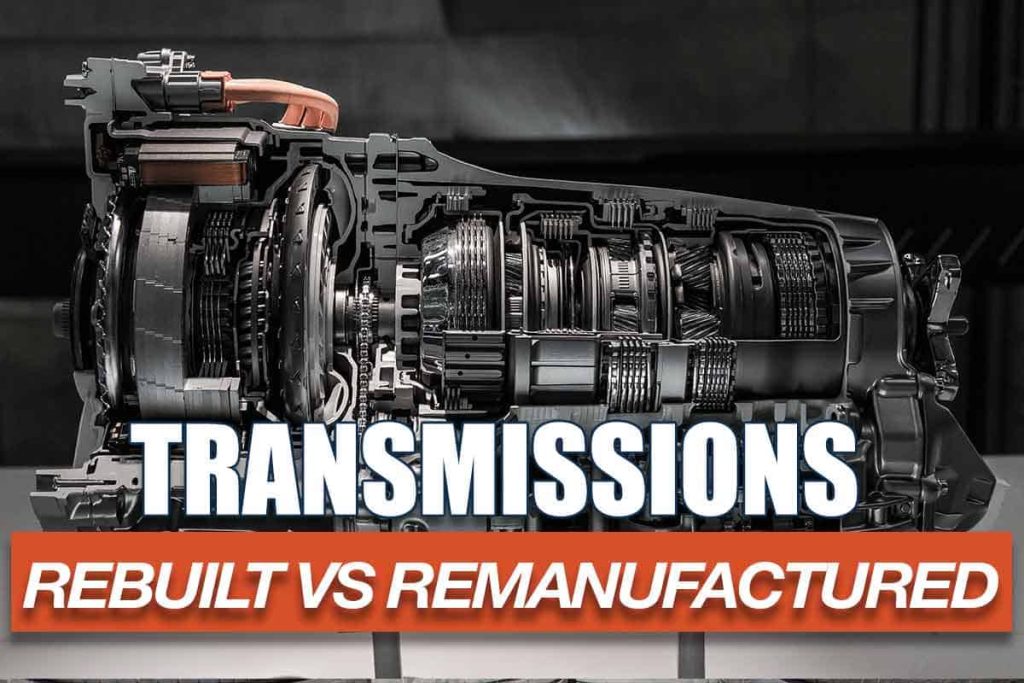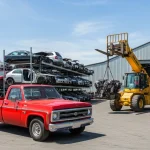Rebuilding a transmission is a labor-intensive, in-depth process that involves removing the transmission, inspecting, cleaning, and replacing its various parts. This includes not only the “hard” components, but also the “soft” parts such as seals, gaskets, clutches, and bands. Such a sophisticated process demands an expert’s touch to ensure reliable performance.
A “reman” or remanufactured transmission is essentially a rebuild to factory “OEM” specifications, but with the work done by specialists beforehand. These specialists examine, replace necessary parts and reassemble all the components and then stock the transmission as a complete unit on warehouse shelves, ready for vehicle installation.

What would be the estimated cost for a rebuilt transmission?
Repairing a transmission could involve replacing just one part or several. Switching out components such as input shafts and solenoids is a more convenient and cost-effective alternative to a total rebuild. Addressing fluid leaks may only require replacing the seals or gaskets. In either scenario, some of the parts could be covered through manufacturer warranty.
If the specific part under scrutiny is not warrantied, or if it turns out your transmission needs comprehensive repairs, you may find yourself in need of a complete transmission rebuild. Unfortunately, general mechanics typically shy away from specialized transmission work, meaning a transmission specialist may be your only option. Though it may get pricey, it is best to address the issue as soon as possible to avoid greater costs down the line.
What’s your budget? For a rebuild, expect to pay around $2800 to $3800, accounting for labor, parts, and contingencies. While a rebuilt transmission is less expensive than purchasing a new one, the latter may be priced between $4,000 and $8,000, contingent on the make and model of your vehicle.
According to the Automatic Transmission Rebuilders Association (ATRA), rebuilt transmissions that meet their minimum standards receive a Golden Rule warranty. ATRA member shops guarantee that consumers purchase only the best-rebuilt transmissions. Discover more by visiting ATRA’s Minimum Rebuild page.

What is the expected time frame for rebuilding a transmission?
Alongside cost, time represents an equally important aspect when undergoing a transmission rebuild. For uncomplicated and commonly available transmissions, a specialist may reconstruct the component in a day. Nonetheless, one must also account for the duration that the specialist requires to diagnose the issue, eliminate the transmission, procure parts (if needed), complete the refurbishing and reattach the entire unit into the vehicle. While several other factors influence the timeframe necessary for the transmission rebuild, transmission shops typically allocate an entire day for each step in the repair or rebuilding sequence.
Labor is the most significant cost factor in transmission rebuilds. On average, experienced rebuilders can tackle two common transmission rebuilds daily, but complicated transmissions may require an entire day. The specialist components and intricate nature of exotic and European models also extend the process.

A More Effective Solution
Remanufacturing your transmission can save both you and your transmission specialist valuable time. When opting for a rebuild, the transmission must be carefully taken apart, parts must be bought and installed, and then the transmission must be reassembled, which can take several days. In contrast, remanufacturing a transmission involves a complete restoration process that brings it back to its original factory standards.
If your vehicle requires a new transmission, consider purchasing a remanufactured one. These units are already fully assembled and can be shipped directly from the remanufacturer, saving you the time and effort of having to rebuild it yourself. Many wholesale retailers keep common transmission types in stock, meaning that you may be able to get back on the road within just 1 to 2 days, depending on the time it takes to order, ship, and install the unit.
Before being sold, a remanufactured transmission undergoes a rigorous quality check and is tested on a dynamometer to measure torque, power, and RPMs. This thorough testing ensures that the transmission functions correctly and meets the original equipment manufacturer’s (OEM) specifications. Additionally, remanufactured transmissions often come with a manufacturer warranty that covers up to 3 years, which is not typically offered when rebuilding a transmission.
What’s better rebuilt or remanufactured transmission?
Remanufactured transmissions offer greater reliability compared to rebuilt systems. Although the actual cost of a reman or rebuilt transmission varies by manufacturer/workshop, remanufactured systems are equipped and ready for shipping from their factories, while rebuilding a transmission into a vehicle takes additional time.
What is the difference between a remanufactured transmission and a rebuilt transmission?
When rebuilding a transmission, it must be removed from the vehicle, disassembled, parts replaced, reassembled, and finally reinstalled. This can take anywhere between 3 to 5 days. However, remanufacturing a transmission entails a complete restoration to OEM standards, ensuring the performance is as good as new.
Should I buy a remanufactured transmission?
When considering various factors, a remanufactured transmission can be the most cost-effective option. Although they are priced lower than new transmissions, they provide the same level of reliability. Additionally, reputable companies usually offer parts guarantees for remanufactured transmissions to ensure their quality.
What is the life expectancy of a remanufactured transmission?
Based on industry standards, a rebuilt transmission can typically provide 30,000 to 50,000 miles of service. However, with proper installation and consistent upkeep, a rebuilt transmission has the potential to last just as long as a brand-new one, covering an additional 120,000 to 150,000 miles.
Should I trust a rebuilt transmission?
If you’re dealing with transmission issues, getting a rebuilt transmission may seem like a viable option. Nonetheless, it’s crucial to avoid allowing an unqualified mechanic to rebuild your transmission, as this could result in further damage. It’s advisable to seek the assistance of a reliable mechanic and have your transmission replaced instead.
Is remanufactured as good as new?
When it comes to quality and durability, a remanufactured part may display some signs of wear, but it is just as dependable as a new part. These remanufactured parts, also known as ‘reman’ parts, are a reliable alternative to brand new parts.
Is remanufactured the same as reconditioned?
To put it in simple terms, a reconditioned engine refers to a unit that has been dismantled, thoroughly cleaned, and may have undergone some repairs before being reconstructed. On the other hand, a remanufactured engine has been restored to the original factory specifications of the vehicle manufacturer.
Is it a good idea to buy a used transmission?
Opting to buy a used transmission can bring you a similar benefit. At local junkyards near me, they usually cost less than new ones, resulting in significant savings that can add up to hundreds of dollars. Additionally, many used transmissions are technically remanufactured, sporting new parts and updates. Incorporating all of these elements will produce a high-quality result that stands the test of time.
Should I have my transmission rebuild?
Rebuilding your vehicle’s transmission can save you a considerable amount of money short-term, especially if you’re looking to forego the stress of monthly car payments. Many drivers find it worthwhile to invest in the initial cost of rebuilding a transmission. Although it may require a significant chunk of change upfront to the tune of $2,500 or more, the benefits often outweigh the costs.
What are the signs your transmission is going out?
If you hear clunking, humming, or whining sounds while driving, it could be a sign of automatic transmission problems. Similarly, faulty manual transmissions may produce loud machine-like sounds without warning. A clear indicator of a transmission issue is a clunking noise when shifting gears. To be safe, it’s best to have a professional mechanic inspect it.




